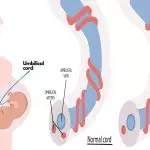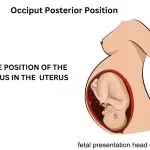
How Does Your Body Change During Week 4 of Pregnancy?
4 min readWritten by Gayathri Lakshminarayanan


The fourth week of pregnancy is quite a tense and exciting moment for every expecting mother. Embryo implantation to the uterine walls acts as a precursor for your pregnancy. But, before going in for the tests, your body throws up specific signals that your little one has just formed. Have you ever wondered how does your body change during week 4 of pregnancy?
If you are an expecting mother who has just ovulated, you need to know how your body change during the week 4 of pregnancy. This article will guide you through the changes your body undergoes when you are pregnant by four weeks.
How Does Your Body Change During Week 4 of Pregnancy?
By the fourth week, your teeny tiny embryo is the size of a poppy seed. Let us look at some common symptoms and changes that your body undergoes during the fourth week of pregnancy.
1. Bloating
You may feel bloated, especially in your abdomen. When the embryo is implanted, your body needs to make space to accommodate the little one. The uterine lining gets thicker, and your womb takes up more space in your abdomen. All this leads to Bloating.
What to Do?
If you experience bloating, you must talk to your doctor about the issue. Most doctors recommend dietary changes rather than medical treatments. The following are some of the steps to prevent bloating.
- Try to eat smaller meals several times a day
- A balanced diet with fresh fruits and vegetables
- Drink about 8 to 10 glasses of water every day
- Gentle physical activity
- Avoid caffeine
2. Spotting or Implantation Bleeding
When the embryo begins to implant itself on the walls of the uterus, it will dig into the endometrium lining to settle there and grow. This leads to slight bloodshed which is commonly known as Implantation bleeding or spotting. Spotting usually occurs during the same period when you expect your period. So, it is often confusing to decide if it is implantation bleeding or period. The significant difference is that, during light spotting, you will not bleed as much as during a period. There will only be spots or traces of blood.
What to Do?
Spotting or Implantation bleeding is normal and cannot be avoided or treated. The most common treatment for spotting is getting plenty of rest.
3. Nausea
Nausea is one of the most common symptoms of pregnancy. During early pregnancy, progesterone levels are high to support the little one in your body. Such high levels of progesterone may make you feel nauseous, tired, and exhausted. Well, this is just the beginning. You will have to face more of this in the upcoming weeks. It is important to note that nausea or tiredness may also occur due to iron deficiencies. Talk to your doctor if you are over-tired.
What to Do?
To prevent or to get rid of nausea,
- Identify and avoid the trigger points. For example, if you don’t like a particular smell, ensure you are not near that
- Drink more water
- Eat small portions of meals several times a day
- Avoid a long gap between your meals. Have a small healthy snack period in between
- Increase the consumption of vitamin B6 and ginger
- Sleep well and take rest
4. Other PMS-Related Symptoms
The fourth week of pregnancy is almost close to the expected date of the period. You may experience symptoms similar to PMS (Premenstrual Symptoms) while you are in the fourth week.
a) Mood Swings
You may always notice mood swings when you get your period. Once aunt Flo arrives, the moon swings will depart their way. It is essential to note that your mood swings will still be there, and you will probably miss your period if you are 4 weeks pregnant.
What to Do?
There is nothing much you can do about mood swings. Talk to your partner and people at home to understand what you are undergoing. Take rest and prioritize sleep.
b) Changes in Breast
The changes in the breast are widespread and are both a PMS and pregnancy-related symptom. The significant changes include tenderness, pain, heaviness, swelling, and sensitivity. You may also notice that the area around the nipple might get darker, and you may feel a sting. Some women may also notice blue veins in the breast. Usually, these changes in PMS are mild and usually disappear once the period arrives. In pregnancy, the changes may continue throughout gestation.
What to Do?
To cope with the breast changes, incredibly tender and sore breasts, wear a well-supported bra on the sides. Padded bras would be of great help during the day. During the night, wear a sleep bra. Night bras are light and soft and provide good support during the night.
c) Cramping
Abdomen cramps are common in PMS as well as pregnancy. During pregnancy, the cramps may persist for several weeks. This can be because of the implantation in early pregnancy and uterine expansion in further weeks.
What to Do?
If you notice cramping during pregnancy,
- Take rest
- Stay hydrated
- Take a warm shower
- Do yoga
- Meditation and
- Practice controlled breathing.
Our body is the best indicator of our mind and well-being. Before taking a home pregnancy test, your body can indicate that you are pregnant. Pay attention and trust your body. The symptoms are not as easy as said, and much-tiring weeks are yet to come. You can follow home remedies or lifestyle changes to cope with the symptoms. While these symptoms are the indications of pregnancy, not every pregnant woman needs to experience them. Some may have a few from the above and some may have absolutely nothing and are still pregnant with a happy baby growing inside. Sailing through this wonderful journey has just begun.
Happy Pregnancy!
Read Also: How Does Your Body Change During Week 5 of Pregnancy?

Gayathri Lakshminarayanan,CA, B.Com
Gayathri’s passion for writing had its foundation at the very early stages of her life when she was on her college editorial board and also won several awards for writing events and book review competitions. She combines her corporate experience with her writing skills and her experience as a homemaker makes her an empathetic contributor in the parenting domain . Her shift from full-time accounting professional to a homemaker gave her career a new direction.Read more.
Responses (0)
Want curated content sharply tailored for your exact stage of parenting?
Related articles
Sponsored content
Discover great local businesses around you for your kids.
Get regular updates, great recommendations and other right stuff at the right time.











